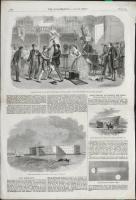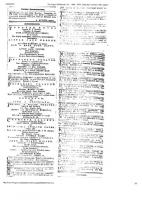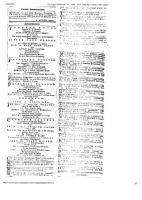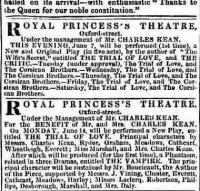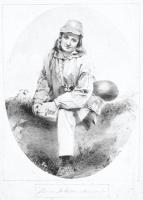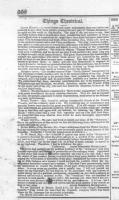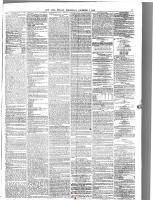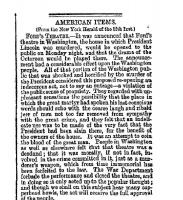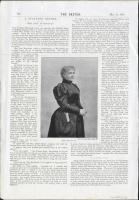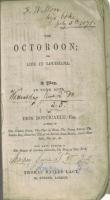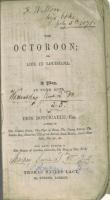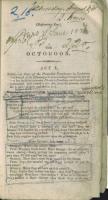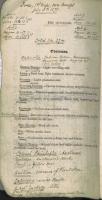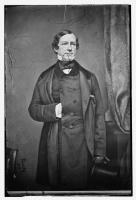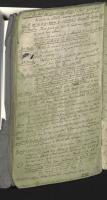Octoroon
Item set
Title
Octoroon
Items
68 items
-
"Sensation Scene" from Mr. Boucicault's New Drama
This review has reprinted what it described as the “sensation scene” of the drama but also noted the “reluctance” felt by the audience at witnessing the graphic death on the heroine in the play’s finale. -
"The Octoroon" review by The Argus Melbourne
This "Argus" article reviews Madame Marie Duret, taking the role of Zoe Peyton for the opening night of "The Octoroon," in Melbourne, Australia. Thus, "The Octoroon" was performed on the colonial stages of Australia a full ten months before it was staged in London. This review provided a detailed description of the plot, and noted the play culminated in the death of Zoe, as it had in the original American version. In America, racist beliefs led to hundreds of years of enslavement of African captives and their descendants; in Australia, such attitudes resulted more specifically in systematic genocide of the native population--though certainly forms of slavery existed. -
Advertisement for Performance at Princess Theatre in Melbourne 1861
The Octoroon was actually performed on the colonial stages of Australia a full ten months before it was staged in London. According to the Melbourne Argus, the first performance of The Octoroon in Australia, advertised as the "first time in the colonies of Bourcicault's [sic] great sensation play, was to take place on January 7, 1861, and featured British actress Madame Marie Duret as Zoe. Little is known about Marie Duret or where she obtained a copy of the script for The Octoroon, which had been printed, but not published in America. -
Agnes Robertson stars in "The Phantom" by Dion Boucicault at Princess's Theatre, London, under the management of Charles Kean
The premiere of “The Phantom” on June 7 1852, is one of the earliest performances of a play by Dion Boucicault in which Agnes Robertson (then aged 19) starred. -
Agnes Robertson, Born December 25, 1833
Born in Scotland, in 1833, Robertson began acting as a child. Early in her career, Robertson performed with such transatlantic leading actors as the American Charlotte Cushman, and British leading actors. At age 16 in1850, Robertson moved to the Princess’s Theatre London through the auspices of then-famous star actor-manager, Charles Kean (and his wife Ellen Tree-Kean). In London, by 1852, she had become involved with one of Kean’s in-house dramatists, Irish playwright, Dion Boucicault and as a result, in 1853, left the London stage to tour America. When she first arrived across the Atlantic, Robertson, a petite beauty who had proved popular with audiences in Britain, was the box office draw, and was often referred to as the “fairy star.” Robertson had several children by Boucicault, including famous performers Dion Jr and Nina Boucicault. In an interview for The Sketch (16 March 1894), the then retired actress described her appearance as Zoe Peyton in The Octoroon as the “most thrilling” of her career. -
Article "Spirit of the Times" featuring a letter from Agnes Robertson about receiving death threats for the performance as Zoe
Almost as soon as "The Octoroon" opened in New York, both Boucicault and Robertson claimed that Robertson had received death threats for appearing on stage as Zoe and, as a result, decided to withdraw from their contract at the Winter Garden Theatre. In a letter published in the Spirit of the Times, Robertson alleged she had "received letters from many families in this city urging the withdrawal or alteration of the play," and she had been "intimidated by letters threatening us with violence." In portraying Zoe, Robertson claimed that she had been "unconsciously made the instrument to wound the feelings of one part of the public to gratify the other." Robertson avowed that she did not want "to make money out of a political excitement--especially on any subject such as slavery, and at such a moment as this. The Octoroon was not intended to succeed on such merits." Apparently it was Robertson's sympathetic portrayal of an enslaved mixed-race woman that inflamed audiences. The threat of actual violence against a racialized and gendered figure on stage, portraying one on the auctionplatform, was a material fact in both the plot and production history of The Octoroon. -
Article discussing canceled performance of The Octoroon after Lincoln's assassination
On the evening of April 14, 1865, at a special performance of the comedy, Our American Cousin, by English playwright Tom Taylor, starring English actress and stage manager Laura Keene, President Abraham Lincoln was shot. And killed by John Wilkes Booth whose family were a major dynasty of American actors and whose brother was famous actor Edwin Booth. The playbills for Our American Cousin had included a notice that the next play to be staged at Ford’s was to be Dion Boucicault’s The Octoroon and by 15th April, a large poster appeared outside the theater advertising the forthcoming performance. That performance did not take place and the theater was closed from 14th April until the execution of Lincoln’s assassin, John Wilkes Booth, in July 1865. Ford had decided to reopen on July 10 also with The Octoroon but again the show was cancelled as a result of threats against both the stage manager and the theater. This article, from the New York Herald, declared the attempt to reopen "an attempt to coin the blood of the great man." Later that year, Ford’s theatre was repurposed as a federal government building and it was not until 1968 that it would again function as a theater. -
Article, Agnes Robertson, 'Biographical Sketch,' The Sketch Newspaper
In this interview ("A Splendid Record: Mrs Dion Boucicault," The Sketch, May 16, 1894, 146), Robertson recounted that it was her appearance in the slave auction scene of The Octoroon that had attracted the most virulent attention when the play had been performed in New York. She claimed that she had been "solemnly warned that if I attempted to play this auction scene I should be shot as I stood on the table to be sold." Robertson also stated that she did not “sympathise with the aims of writers who wish to use the stage as a moral dissecting-room.” Yet Robertson also cited as “most thrilling” her appearance as Zoe. -
Britannia Prompt Book
"At the University of Kent, in Canterbury, England, we have explored an Octoroon promptbook belonging to Frederick Wilton, an actor and stage manager of the Britannia Theatre in London's East End from 1846 to 1875 (""Octoroon: A Collection of Parts,"" Promptbook at Templeman Library University of Kent). Wilton performed the role of Salem Scudder in an 1871 production of the play. Two of the ‘sides’ or character part script promptbooks are from members of Britannia Theatre company, Frederick Wilton, stage manager {“Octoroon ‘Scudder” book in Kent Library, but Wilton actually played Sunnyside in 1871 according to ammendations to cast notes inside}; and Mrs. S[am] Lane’s “Octoroon “Pete” part, inscribed “Mrs. Sarah Lane, Britannia Theatre, Hoxton, July 6 1871.” [Sarah Lane was widow of Sam Lane, and became manager of the Britannia]. These were written on Boucicault, The Octoroon, London: Thomas Hailes Lacy, 1861) edition of Octoroon and contain handwritten notations for at least 3 different possible endings.} -
Britannia Prompt Book Title Page
The Britannia Promptbooks mention several performances of The Octoroon (in addition to bearing the inscription from F. Wilton “hys Boke,”) during the management of Sarah Lane, including Wednesday 2 June 1880. The performance lasted “2.5.” Another performance was noted for Monday June 21, 1880, with the same running time. Additionally, an “average” performance time of “2.0” is noted, suggesting that performances of 2.5 hours included a fifth act, which is supported by the handwritten notations in the promptbook, which restore the original ending of the play as it had been performed in New York in 1859, with the heroine committing suicide. -
Britannia Prompt Book, Act 1, Page 1
One of the important resources for this Octoroon project is the “Scudder” part of the Octoroon promptbook at the University of Kent's Templeman Library. The first page in Act I of this artifact features handwritten information about several performances in the Britannia theatre and their running times. These variation is running time tell us about the different types of performances that may have featured on those nights, which has helped us to understand that even though Boucicault reduced the running time in early 1862, subsequent productions of The Octoroon reverted back to the longer, five act versions, which ended either with the heroine’s death or with her happy union with her lover. -
Britannia Prompt Book, Costume Page
The Octoroon promptbook belonging to Frederick Wilton is held at the Univeity of Kent’s Templeman library. Wilton's promptbook is playfully inscribed, "F. Wilton hys boke July 5 1871," and it consists a copy of the published four-act script of The Octoroon, (in which the heroine neither kills herself, nor marries her white suitor, George, but appears silently in his arms in a concluding tableau), into which numerous pages of handwritten annotations are added. In this printed four-act version, the printed pages of the script conclude with stage directions that merely state that "George enters, bearing Zoe in his arms--all the characters rush on." Characters watch as the steamboat Magnolia explodes onstage, along with this spectacular stage effect, they form a "grand tableaux," that is followed by the "Curtain." -
Dion Boucicault heads to America
Dion Boucicault left Britain and headed to the United States. He travelled first to New York, following Agnes Robertson who had left 2 weeks earlier, to perform in Montreal, and then in New York. -
Dion Boucicault's first marriage
Boucicault, while in France, met and married wealthy French widow, Anne Guiot, who died of a fall in the Alps shortly after their marriage. -
Dionysius Lardner Boursiquot (Dion Boucicault) born in Gardiner Street, Dublin,
Nominally the youngest son of Samuel Boursiquot, it is likely that Dion Boucicault was the biological son of family friend and neighbour, Dionysius Lardner. Boucicault's mother, Anne Darley, was from a family of Dublin Protestants and his nominal father, Samuel Boursiquot, apparently of Huguenot ancestry. In 1828, at the age of 8, Boucicault was schooled in England, funded by Lardner. -
Dublin, Ireland
Dion Boucicault was born in Dublin in 1820 -
Edinburgh, Scotland
Agnes Robertson was Born in Scotland, in 1833 -
Fernando Wood was elected mayor of New York City
Pro-South democrat Fernando Wood was elected mayor of New York City on December 6, the same day that The Octoroon opened at the Winter Garden Theatre. Fernando Wood was an American politician of the Democratic Party and the 73rd and the 75th mayor of New York City; he also served as a United States Representative and as Chairman of the Committee on Ways and Means in both the 45th and 46th Congress. -
Frederick Charles Wilton
stage manager and actor – (1802-1899) was born 3 December 1802 in Bristol. He went on to become a famous actor and stage manager. During the period 1826-7, he performed on the stage in Perth. From 1846 to 1875, Frederick Charles Wilton was the very successful stage manager of the Britannia Theatre in London’s East End. A keen diarist, he died 8 September 1889 in Sydney, Australia, where he had retired to in 1876. -
Frederick Wilton's Prompt Book, Performance of "The Octoroon" at the Britannia Theatre, Hoxton, London, July 5, 1871
Frederick Wilton's Octoroon promptbook, from the Britannia Theatre, held at the University of Kent Templeman Library, is constructed from a copy of the published four-act edition (as performed at the Adelphi in London in 1862) and also contains additional pages with handwritten notations inscribed in at least two obviously different hands that, along with the printed script, account for three or four different possible endings. Inscribed in ink on pages 6-7 is the notation "Time, first night, own benefit, July 5, 1871, Act 1 began 9:30 . . . Act 4 ended 11:57 total 2h. 27m." According to the notes written onto the otherwise final blank pages, this version of The Octoroon concluded when George rushed onto the boat where M'Closky has taken Zoe. Crossing to centre stage, George attacked M'Closky while proclaiming "His life or mine! Zoe once in my arms, I'll bear her away to England where there is but one blood--that which beats in the hearts of honest men & loving women." This line echoes, almost exactly, the published reports from both the Saturday Review and the Illustrated London News, of Boucicault's "new" British ending performed a decade earlier, of which there is no published or previously located account. This page is important therefore, in revealing portions of that long-missing script.


